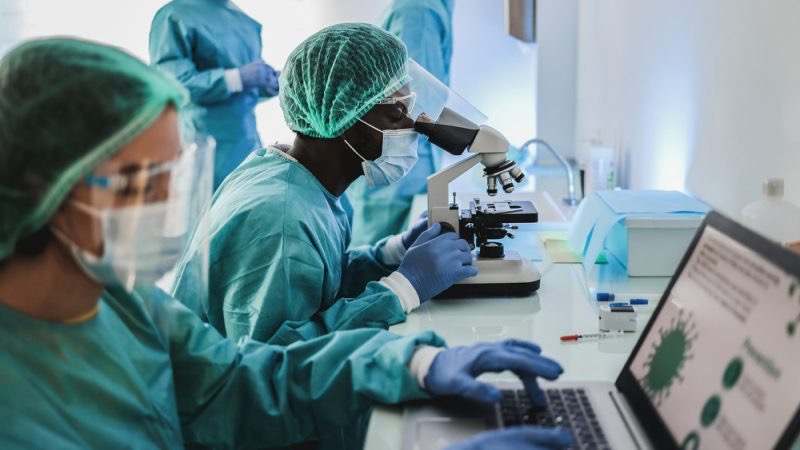In case another pandemic hits, building manufacturing capacities for Africa, a continent that it is expected to experience a three-fold increase in vaccine demand by 2040, is essential. [SHUTTERSTOCK/DisobeyArt]
This article is part of our special report COVID-19 vaccination achievements and challenges in Africa.
Billions of COVID-19 vaccines reached Africa only when rich countries’ populations were vaccinated, but building up manufacturing capacities in Africa could ensure African countries are not left behind.
When the COVID-19 pandemic hit the world, the saying ‘no one is safe until everyone is safe’ seemed even more pertinent.
“That sounded great,” Mohga Kamal-Yanni, global health policy advisor at the People’s Vaccine, told EURACTIV.
But, according to her, once vaccines came into the market, “all that was forgotten”.
“This ‘no one is safe…’ – they talked about it. But in reality, they ignored it,” Kamal-Yanni said, referring to countries that secured their doses in advance.
In the scientific journal Lancet, the global race to roll out COVID-19 mass vaccination was called “unprecedented, characterised by high-income countries adopting strategies such as pre-ordering millions of doses before the COVID-19 vaccines completed clinical trials”.
This resulted in the world’s poorest nations receiving only 0.2% of the 700 million COVID-19 vaccine doses made by April 2021, while more than 87% of global vaccine stocks went to high-income countries.
“Vaccines came later in Africa than in other countries. At the beginning of the pandemic, there were not enough vaccines for everyone,” Arsene Enyegue, manager of the World Health Organisation (WHO)’s AFRO project, said during the symposium organised in Dar Es Salaam, Tanzania, on 16-17 May.
Kamal-Yanni stressed that “countries paid for orders that are five times or three times or twice their population”.
“We got the first dose, the second dose, and then even started to go for a booster while health workers in Africa didn’t even get the first vaccine dose,” she said.
Rewriting history
The surge of COVID-19 vaccines to enable mass vaccination only reached Africa at the end of 2021 as donations from countries such as China, the United Arab Emirates, India, and Russia.
The United Nations-led COVAX initiative received nearly 270 million Oxford/AstraZeneca and Pfizer/BioNTech doses as of January 2022.
According to the EU Commission’s figures, by the end of April 2023, EU countries had donated 215.9 million doses of COVID-19 vaccines to Africa via COVAX, and 22.9 million doses via bilateral donations.
But according to Kamal-Yanni, the vaccine donations came late. “What people are saying now, they are rewriting history,” Kamal-Yanni said.
“They say COVAX delivered 2 billion doses. Yes, there was a surge at the end of 2021, but not at the height of COVID when people were ready for vaccination and were ignored,” she stressed.
Kamal-Yanni added that at the pandemic’s beginning, “Northern rich countries wouldn’t share the doses, they wouldn’t enforce or mandate sharing technology, they wouldn’t wave IP so they wouldn’t allow developing countries to produce vaccines”.
The lessons to be learned
If another pandemic hits, building manufacturing capacities for Africa, a continent expected to experience a three-fold increase in vaccine demand by 2040, is essential not to repeat the same scenario.
“In order meet the vaccine demands of a rapidly growing population, and to be able to provide novel vaccines to its population in the future, the African continent must develop a sustainable vaccine manufacturing infrastructure,” it is stated in a scientific paper by Lewis John Rubin Thompson and others.
Only 1% of the vaccines administered in Africa are produced by manufacturers based in five countries: Egypt, Morocco, Senegal, South Africa, and Tunisia.
Commenting on the vaccines and medicines manufacturing capacities in Africa, Commission’s spokesperson told EURACTIV that “[it] is not only unfair but also presents a major challenge to the resilience of global health supply chains and leaves the door open to substandard or falsified products in Africa”.
To address this issue on April 13, 2021, African leaders committed to boosting the share of vaccines manufactured in Africa from 1% in 2021 to 60% by 2040. According to a paper published in Lancet, this will require heavy long-term financing, government and stakeholder commitment to purchase manufactured vaccines, expanded research capacity, and strategic regulatory support and guidance.
Kamal-Yanni stressed the need to invest in local manufacturing for all countries. “Local manufacturing is not building a factory. This is the R&D, it’s scientists, the engineers, that do the vaccines,” she said.
She added that building manufacturing capacities has to start now “and then when the problem happens, then you have the factory, and you can produce whatever needed to be produced.”
At the G20 in May 2021, Ursula von der Leyen announced €1 billion worth of Team Europe investment for manufacturing, access to vaccines, medicines and health technologies (MAV+).
“The expectation is for Africa to produce vaccines and essential health products against several diseases in a sustainable way,” the Commission’s spokesperson said adding that the initiative works in close alignment with the African Union and seeks equitable access for all.
At the end of November 2022, over €20 million was announced to be granted through this program to advance the African Medicines Regulatory Harmonisation (AMRH) program and the operationalisation of the African Medicines Agency (AMA), and help to create the Team Europe Support Structure (TESS).
In the meantime, Kamal-Yanni highlighted the mRNA technology hub facility at Afrigen, South Africa, that was established at the end of April 2023 by WHO and the Medicines Patent Pool and supported by EU, France, Germany, Canada and other local and international partners.
The mRNA technology hub aims to build manufacturing capacity in Low and Middle-Income Countries (LMICs) to produce mRNA vaccines to improve health security through local production of mRNA COVID-19 vaccines.
“If this can happen from now, then when there is a pandemic, actually, we can stop pandemics from becoming pandemics,” Kamal-Yanni said.
[Edited by Gerardo Fortuna/Alice Taylor]




